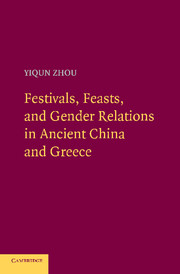5 - What Women Sang Of
Published online by Cambridge University Press: 03 May 2011
Summary
Women sang in ancient China and Greece, both when they were weighed down with work and solitude and when they were enjoying leisure and company. What they sang of in both situations is the subject of this chapter. As I will show, Greek women tended to make friendship and, to a lesser extent, the mother–daughter bond the themes of their songs, whereas husbands, in-laws, and sometimes parents were the preoccupations in the poetry believed to have been composed by Chinese women.
A discussion of women's voices will add a crucial dimension to our understanding of the conceptions of gender relations in the two societies by providing an insight into the feelings of those who so far in the study have appeared mainly as objects in the ideologies and institutions created and dominated by men. Before I attempt to retrieve the female perspective, however, I must first address the issue of the nature of the available primary sources, and most importantly, how “genuine” the “women's voices” that have come down to us are.
The question of “genuineness” is a relatively straightforward one to answer for the works by Greek women poets. From the poems of the great, “burning” Sappho in the late seventh/early sixth centuries bce to those of Erinna, Anyte, and Nossis in the fourth and third centuries bce, we have a corpus of poetry by women whose historicity and literary reputations are amply attested in ancient (mostly classical and Hellenistic) sources.
- Type
- Chapter
- Information
- Publisher: Cambridge University PressPrint publication year: 2010

